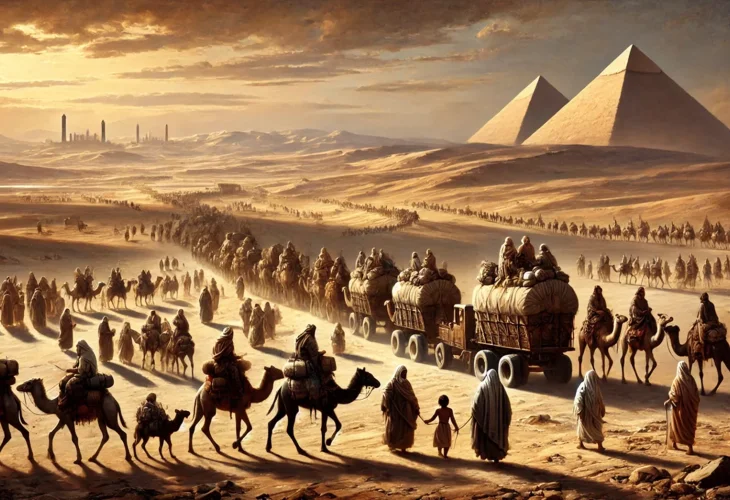Journey of Destiny: Egyptian Exile and the Birth of a Nation
Hashem decreed that Abraham's descendants would be strangers in a foreign land, enslaved and oppressed for 400 years. This promise of exile formed us as a nation with a mission, not merely a tribe settling in its land, building homes, and planting vineyards, potentially forgetting its purpose.

Hashem decreed that Abraham's descendants would be strangers in a foreign land, enslaved and oppressed for 400 years. The sojourn of Abraham and his seed would begin with the covenant and last until 400 years had passed. Abraham never dwelled in one place for long; he was always on the move. During exile, they would be enslaved and oppressed, but it was not revealed how long they would endure the oppression or in which land this would occur.
The sages said that this was contingent on the actions of the Israelites. If they sinned more, they would be oppressed for more years, and Hashem, seeing their suffering, weighed matters, deeming that the years of bondage in Egypt—fewer than 200—were sufficient to fulfill the decree.
This promise of exile formed us as a nation with a mission, not merely as a tribe settling in its land, building homes, and planting vineyards, potentially forgetting its purpose. First, the nation of Israel was refined in the melting pot of gold and the crucible of trials, becoming a faithful son to Hashem, continuing the tradition of the forefathers amidst wanderings, edicts, and persecutions. This is the wondrous nature of the Torah and the people of Israel, who have survived thus through many generations. Part of what gave us strength was this first exile, which began even before we became a nation. A Moabite exiled from his land forgets his homeland, but a Jew knows that his forefathers also wandered and traveled; this is not the end. They remained faithful to Hashem, who returned them to their land.
The lands designated for the tribes of Israel were known to them through tradition from their father by divine inspiration, and we see Jacob, before his death, mentioning the territories of some tribes, such as "Zebulun shall dwell at the seaside." Moses also says to Dan, "Leap from Bashan," and to Naphtali, "Possess the sea and the south," with Jacob explicitly stating concerning Joseph, "I have given you one portion over your brothers," that Shechem will be Joseph's inheritance. We also see Judah going to shear his sheep in Adullam, part of the tribe of Judah's inheritance.
Even after the children of Israel descended into Egypt, the descendants of Joseph still held onto their lands in Canaan; they were the family of the governor and had the right to oversee their territories. Chronicles recounts that Sheerah, daughter of Ephraim, built a city in Ephraim's inheritance even before Egypt's enslavement. According to some commentators, even what is described in the Torah, Jaire the son of Manasseh building Havvoth Jaire, refers to events before Egypt's enslavement.
Jacob mentions parts of the land he fought to conquer: "Which I took from the Amorite with my sword and my bow." The sages interpreted this to mean his prayers, but surely, the plain meaning includes the fact that they indeed battled the Amorites and settled the lands.
The great sin of selling Joseph disrupted the beginning of settlement in the land. Hashem put the children of Israel to the test of discord, which they failed. Even though both sides acted for the sake of Heaven, they needed to find a way to resolve the conflict without resorting to selling Joseph into Egypt. Thus, this sale led to the Egyptian exile.
Yet, nothing happens without a reason. The selling of Joseph also served as punishment for Jacob, for sins that are difficult for us to understand, but apparently, at his level of righteousness, Hashem demands strictness. Those twenty-two years during which Joseph was separated from Jacob, his beloved son, corresponded to the twenty-two years during which Jacob fled from the Land of Israel and stayed in Haran. Although he fled not by choice but because of Esau's threat to kill him, he still required atonement for the grief caused to Isaac—the atonement was the terrible sorrow he felt when he thought Joseph was dead.
Not only the separation from Joseph but also how it happened reminds us of Jacob's own actions. Jacob’s sons took Joseph's coat, slaughtered a goat, dipped it in its blood, and said, "Do you recognize whether this is your son's coat?" They deceived their old father. This is akin to what Jacob did to his father: covering himself with goat skins and saying, "Perhaps my father will touch me." Even there, Jacob acted on the righteous instruction of his mother Rebekah; still, at his great level, Heaven filed a demand against him, as the Midrash states.
The deeds of the forefathers teach us that every action holds significance, and every wrongdoing carries a cost that eventually affects us or our descendants. A small good deed repairs the world, and the reverse is also true.

